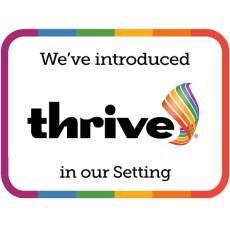Thrive
Thrive
Rationale for Nurture Provision
Here at St Mary’s our teaching and learning is built upon a foundation that is inclusive, supportive, challenging and empowering. We promote high expectations, aspirations and an intense engagement in learning. This supports learners in establishing the values, attitudes, skills and knowledge through which they will be able to achieve success, gain fulfilment in the future and become life-long learners.
Children have special educational needs if they have a need that presents a barrier for learning, this may be academic, social or emotional and which calls for special educational provision to be made for them.
Teachers are responsible and accountable for all the children in their classes and provide High Quality teaching, including effective differentiation, by planning lessons that consider all needs and remove barriers so every pupil can achieve.
However, for some pupils, accessing the curriculum within a mainstream setting can be a challenge and a barrier to learning in itself. This may be because of a learning, emotional and/or social or medical need.
Research has shown that the way we behave is linked to how we feel and our emotions are linked to how we learn. By teaching children to recognise and notice these feelings and emotions it can help with their development and learning. Children sometimes need some extra support with their emotional growth and this can be temporary or over a longer period of time.
Levels of support
Here at St Mary's we work as a team to provide exceptional pastoral care that is based on the individual needs of the children. We constantly reassess the support we provide to ensure we are helping children to develop socially and emotionally. We work alongside families to ensure a comprehensive approach to supporting each child and this input from families is both essential and invaluable.
We have our own Pastoral Team who are:
Mrs Sutcliffe - DSL AND SENCO
Mrs Plant - EYFS Thrive Practitioner
Ms James - Thrive Practitioner
Miss Cunningham - Family Support Worker
Pupils at St Mary's are supported through a variety of interventions and in a variety of ways through:
- Support with social and emotional issues that can be accessed through whole class Thrive Activities, work with the class teacher and their peers.
- A structured and personalised approach with time both in and out of the classroom completing thrive activities, often based in the Thrive Rooms with Mrs Barnes who is our trained Thrive Practitioner
- Daily focussed and regular interventions to support difficulties they may be experiencing. This will include personalised thrive activities, a personalised timetable and some alternative provision, these are usually based in the Thrive rooms and other areas of the school.
Nurture Provision for every child
At St Mary's we are proud to use the THRIVE Approach to support emotional and social development. This includes whole class activities, group sessions and also interventions for individuals. There is a recognised link between children’s sense of wellbeing and their success as learners. Nurture support is not limited to specific individuals or groups, as we embed nurturing principles and practice at a whole school level, providing appropriate support for all pupils attending our school. We will facilitate this through the use of THRIVE interventions and activities with classes throughout our school. We utilise strategies to overcome difficulties through the provision of a social and emotional curriculum in every year group. This aims to develop their social skills and understand their emotional needs. This enables many children to be successful in their academic learning.
Thrive support
Some children need a further intervention to support them and our fully trained Thrive practitioner, Mrs Barnes, works with these children through individual or group sessions that are personalised to meet their needs. Mrs Plant is our trained EYFS Thrive practitioner.
Some of the difficulties these children may have include:
- Difficulties with friendships.
- Getting into trouble at playtime.
- Finding it hard to settle into the classroom routine/structure.
- Finding it difficult to manage their strong feelings.
- Not knowing who to turn to when feelings are too big to manage on their own.
These situations can lead to many different feelings, which can feel overwhelming at times. They might include: anger, frustration, sadness, loneliness, confusion or anxiety. All these feelings are very normal and are felt by many children.
Thrive sessions for individuals or small groups
The Thrive approach offers practical strategies and techniques and is built around online assessments which identify children’s emotional development and provides action plans for their individual needs.
Thrive promotes children’s emotional and social growth by building positive relationships between a child and their peers and helps them explore and understand their feelings through various activities.
Thrive sessions
The session may be on an individual basis or as part of a small group of children. During each session there will be an activity which may include:
- Story telling
- Circle games
- Arts and crafts
- Sand play
- Movement and relaxation
- Hand and foot massage
- Cooking and preparing food
- Role play and puppet work
- Games
Pupil profiles are undertaken by class teachers in order to identify the area of need. An action plan of activities to support pupil development is created and a series of activities and interventions are put in place. At the end of approximately 6 weeks, pupils are assessed, progress measured and a new action plan created.
The Nurture Group and the Thrive Room
Some children will join our nurture group and be based in a room called the Thrive Room. Here, a trained Thrive or nurture practitioner, will plan activities to support the children’s social and emotional needs and work towards having more successful time in their own year groups.
The Thrive room is designed to be a bridge between home and school; a place where children can feel safe and secure and therefore develop their individual needs further. It has a central table where collaborative projects can be worked on. There is a cosy seating area on the floor to play games and work collaboratively plus lots of sensory, calming resources. There are a wide range of resources to support sensory needs and some of the learning will take place in other areas of the school, including the outdoor areas.
The Purpose and the Philosophy
There will be between 6-10 children based in the Thrive Room, some will be full time while others may attend for dedicated sessions. Its composition is carefully well thought-out to create a balanced and functional group. Its purpose is to offer children opportunities to re-visit early learning skills and promote and support their social and emotional development. There is much research evidence that children’s learning is most effective when they have a sense of emotional well- being, good self -esteem and a feeling of belonging to their school community. The Thrive Room provides children with this opportunity and so helps to develop their maturity and resilience. This is a place of safety, positivity and a place of learning.
The philosophy of the nurture group is drawn from the principles established by the work of Marjorie Boxall and others.
The Nurture Group Principles:
- Children’s learning is understood and assessed developmentally
- The classroom offers a safe base
- All behaviour is communication
- Recognises the importance of transition in children's lives
- Has an adult/child ration of 1:3, and provides lots of opportunities for speaking and listening activities
- Builds a child’s self-esteem, confidence and well-being
- Builds skills for classroom learning
- Language is a vital means of communication
Which children will attend The Thrive Room or nurture?
Children may be part of this nurture group for specific reasons which may be a barrier for learning, for example:
- Family illness or break-up
- Friendship difficulties – keeping/making friends
- ·Quiet, shy, withdrawn
- Find it hard to listen to others or join in
- Disrupting own and other’s learning
- Find it hard to accept losing a game
- Find it hard to share and take turns
- Find it a bit tricky to focus and settle in class
- Low self esteem
- Poor relationships both in & out of school
- Bereavement
How will being part of this group help my child?
These sessions are meant to help them manage situations and increase their skills to become more successful learners.
- The nurture group aims to boost confidence and self- esteem and provide children with the extra help they sometimes need to improve social skills and independence for example:
- To join in
- To settle
- To listen
- To concentrate & focus on their learning
- To share and take turns
- To accept losing a game
- To build up friendships with their classmates
- It gives them a chance and helps to encourage a more positive profile among their peers and members of staff.
How long will my child be in the Nurture group for?
Each child’s needs differ from their peers. Children attend for a 6-week cycle before reassessment and then further discussion and planning. Our sessions our based in the morning and the children have a chance to attend our dinnertime nurture club too with Miss James. Thrive sessions run at alternate times during the afternoons.
What will my child be learning as part of the nurture group?
A timetable of activities will be available to outline what will take place. There will be a mix of joint projects, outside activities, sports and specific Thrive activities to support and develop successful social and emotional aspects.


